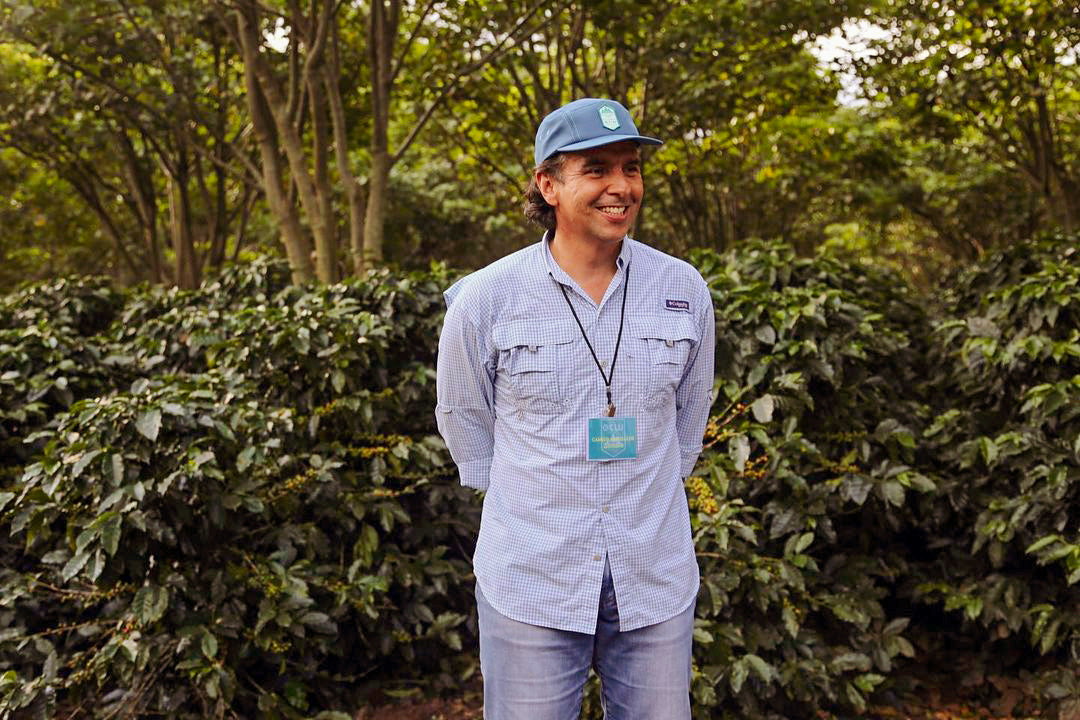In the wide world of coffee producers, Camilo Merizalde stands out as a unique and inspiring figure. Unlike many of his peers, Camilo doesn’t come from a long line of coffee farmers. Nevertheless, his childhood memories of spending summers sliding down the coffee fields in Colombia have set the stage for a remarkable journey into the world of coffee.

Camilo’s path always seemed destined to return to coffee in one shape or another. His first job out of college was at a financial company in Colombia—nothing at all to do with coffee. This job allowed him to travel to Europe and America building connections that would prove invaluable once he got into the coffee-selling business. Colombia’s fine reputation for coffee preceded him, everywhere he went people asked, "Where can I find great Colombian coffee?" His response was simple: "Colombia has the best coffees. Just go to Colombia and get them.”
Feeling nostalgic for the coffee of his homeland, Camilo delved deeper into the state of coffee in Colombia. He discovered that climate change had adversely affected coffee quality and farmers were moving away from some more traditional coffee varieties in favour of newer and more productive ones.
“If You Build It, They Will Come…”
As a young man with lots of ideas and big dreams, Camilo embarked on a new journey to revive these traditional growing methods. Armed with his computer, beautiful maps of Colombian coffee regions, and a passion for innovation, he began visiting clients in America, Asia, and Europe. Remarkably, he started selling his coffee without even owning a single coffee tree.

In 1999, Camilo realised his dream of building a coffee farm in Popayan, Cauca. He meticulously designed a sprawling two-thousand square metre test farm, obtaining 22 different coffee varieties and planting 1.5 million coffee trees. The process of planning the farm and gathering seedlings took about two years. As well as bringing in Typica and Bourbon seedlings from Huila, Camilo sourced Geisha plants from experimental agricultural gardens. By 2002 his farm was ready and he’d already sold his first container to coffee roasters in Japan and the United States.
He called this first farm Santuario, which means ‘sanctuary,’ and that’s exactly what Camilo wanted the farm to be—a sanctuary for both work and peace. Camilo saw a lot of need to help the communities around him in Colombia and through the Santuario Project he’s been able to provide not only jobs but a peaceful place for his workers.
Mastering the Art of Fermentation
In the years that followed, Camilo established a high-volume processing centre on his farm, which aimed to enhance the quality of coffee. However, his approach is not just limited to quality, but also focuses on developing styles and techniques that rely on scientific processes, ensuring that they remain consistent and proven year after year.

Camilo’s exploration of coffee processing propelled him to experiment with fermentation. His early focus was on really clean, washed coffees but started to see the rising popularity of fermentation in coffee. He began working with agronomists, such as Edwin Noreña from Campo Hermoso, who helped him hone his fermentation techniques, embracing the principles of controlled temperature, pH, sweetness, and steady fermentation. Edwin is an agroindustrial engineer, Q Grader, Q Processing Expert, international coffee processing consultant and head competition judge of the COE Colombia. On top of all that his work with Camilo and Santuario has pioneered many innovative processing methods, including our highly anticipated Campo Hermoso Gesha lot (try it for yourself here!).
Camilo's work in the coffee industry has always been driven by his clients. Through regular visits to coffee-producing countries, he gains invaluable feedback. This iterative process helps tailor coffee profiles to suit the preferences of consumers in diverse cultures, from Europe to the Middle East. With access to both conventional and experimental processing methods, Camilo and Santuario soon increased their presence in the specialty coffee market and started to supply a range of spectacular coffees to roasters.
A Sanctuary of Coffee Innovation
Camilo’s dedication to quality led to the establishment of coffee farms in various countries, including Campo Hermoso in Colombia, Tres Milagros in Costa Rica, Ixhuatlán del Café in Mexico, Santuario Sul in Brazil and Santuario Gesha Village in Ethiopia. In November, they’ll be expanding into their sixth origin, launching their first farm in El Salvador.

The Santuario Project’s commitment to quality extends beyond coffee production. Their work has played a pivotal role in boosting local economies and transforming the way coffee is harvested and processed. In Mexico, Santuario works with 50 families and during harvest season, there are at least 2,000 people working all over Santuario. However, as in many origin countries, a significant number of smallholder coffee farmers in Mexico struggle to drive up the quality of their crops and increase their income.
Camilo actively promotes knowledge sharing in the coffee industry, teaching the farmers about the importance of shade trees, intercropping to improve soil health and selective harvesting to get a better price for prime cherries. He conducts workshops in Colombia, inviting workers from all over Santuario to come together to learn about the coffee production process. Collaboration is key, and Camilo's emphasis on collaboration is a testament to his dedication to excellence.
Camilo's humility shines through as he acknowledges the countless faces behind Santuario's success. It's not just about him; it's about the collaborative effort of a dedicated team. Camilo's journey is a testament to the power of passion, innovation, and dedication. From his unconventional beginnings to his pioneering work in coffee processing, Camilo's story is truly an inspiring one.



